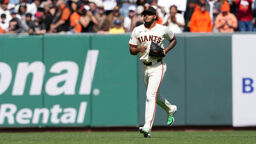(This story was published in 2002).
San Francisco 49ers running back Garrison Hearst apologized Friday for saying he didn’t want any “faggots” as teammates.
“First of all, I want to apologize for the comments that I made, and to the gay community,” Hearst said at the team’s headquarters in Santa Clara before a packed media house. “I didn’t realize it would be so harmful. I want to direct it to my teammates for causing a disturbance among the team before this game.
“Being an African-American, I know that discrimination is wrong and I was wrong for saying what I said about anybody–any race, any religion. I want to apologize to the San Francisco 49ers organization, the City of San Francisco for the comments that I made, and to my teammates for bringing this distraction upon us. I hope that everyone can accept my apology. Thank you.” He did not answer any questions.
Hearst’s comments came a day after the media in the Bay Area were alerted by Outsports to his Nov. 1 remarks in the Fresno Bee. In a column examining the reaction to the coming out of former defensive lineman Esera Tuaolo, Hearst told the Bee: “Aww, hell no! I don’t want any faggots on my team. I know this might not be what people want to hear, but that’s a punk. I don’t want any faggots in this locker room.”
Every newspaper, radio and TV station covering the team had detailed stories on Hearst’s homophobic remarks on Friday, causing the player and 49ers management to express their regret.
“These comments were inappropriate and hurtful to the Gay and Lesbian community, our fans, the City of San Francisco, and the NFL,” read part of a statement by team owner John York. “We expect better from our employees and we regret the negative impact these comments have caused. We will continue to educate our team and employees regarding tolerance and awareness.”
Coach Steve Mariucci, who a day earlier had nothing to say about Hearst’s remarks, took a different tack on Friday.
“Let me apologize, too, for not addressing this sooner,” Mariucci said. “I should explain myself. … I felt I needed to learn more about it before I could say anything intelligently.
“As a coach, as a teacher, as a father, personally I have a strong belief in tolerance, equality and civil rights, equal opportunity and I hope that’s reflected in the way I live my life. There’s no place in this organization, on this team or in our society for that matter, there’s no place for discrimination of any sort. …
“Those comments aren’t warranted anywhere in this country, whether it’s in Iron Mountain, Mich., [Mariucci’s hometown] or Timbuktu or San Francisco. It’s not acceptable, but especially in San Francisco.”
No Punishment
Despite their condemnation of Hearst’s remarks, the team said it had no plans to fine or otherwise punish their leading rusher. “No,” Mariucci said about discipline. “It’s money out of a paycheck. That doesn’t teach us anything. The lesson is much more important than any sort of fine. Garrison certainly learned something. I think our team is going to learn something, and I did, too.” Mariucci said he addressed the team on the issue in a 15-minute meeting.
The Niners’ decision not to punish Hearst is in contrast to the position by Major League Baseball in 2000 to racist and anti-gay comments by pitcher John Rocker. He was fined and suspended. NFL spokesman Greg Aiello, when asked by Roger Phillips of the Oakland Tribune whether the league would punish Hearst, said, “Not that I’m aware of at this time, but that could change. I really couldn’t tell you at this point.”
Asked to explain the difference between Hearst’s and Rocker’s comments, Aiello said, “I don’t know. I don’t think that’s a fair question at this point for me sitting here in New York hearing about it. I can’t make a comparison to the John Rocker situation.”
In his statement, York noted that the 49ers offer domestic partnership benefits to its employees. He also said he had personally spoken to Hearst.
“I have spoken to Garrison about his comments and to educate him on the hurtful effect they have had on so many people,” York said. ” The 49ers and I are supportive of Garrison as a person and have talked with him today about discrimination, including the terrible history of discrimination against African Americans, as well as sensitivity and tolerance. I believe that Garrison has a much better understanding about tolerance today than when he made his comments.”
The attention to Hearst’s comments took at least one player by surprise, indicating that “faggot” might be a common epithet in the locker room.
“If people really know what’s going on in the locker room and what we joke about every day, it would be a big deal each and every day,” fullback Fred Beasley told the Associated Press. “It’s not a big deal to us.”
Mariucci indicated that a player’s sexual orientation would matter little to him.
“The bottom line is, is a fellow good enough to play football for the 49ers?” Mariucci said. “It doesn’t matter where he’s from, or his sexual orientation or his race or his color or any of that. Is he good enough to play for the 49ers, and if that’s the case, then he can be on my football team.”







































